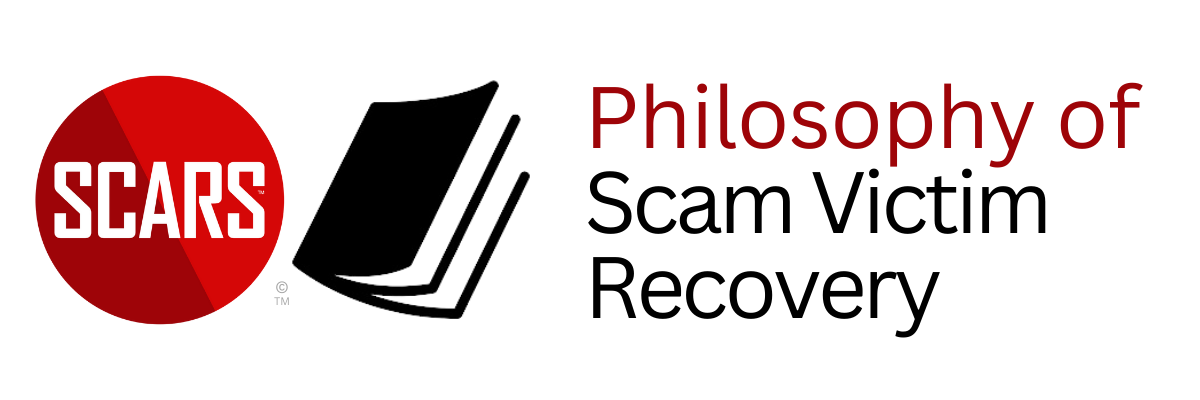Conscientiousness for Scam Victim Recovery Helps Guarantee Success
Conscientiousness in Scam Victim Recovery Makes a World of Difference
Primary Category: Philosophy of Scam Victim Recovery
Author:
• Tim McGuinness, Ph.D., DFin, MCPO, MAnth – Anthropologist, Scientist, Polymath, Director of the Society of Citizens Against Relationship Scams Inc.
About This Article
Conscientiousness plays a vital role in scam victim recovery by providing structure, discipline, and focus during a time of uncertainty and emotional distress. It involves setting clear goals, organizing daily tasks, and being mindful in decision-making, which helps victims regain control over their lives and rebuild confidence.
By practicing conscientiousness, scam victims can reduce anxiety, create predictability, and develop resilience in the face of emotional and financial challenges. Integrating conscientious habits into daily life—such as financial planning, self-care, and setting relationship boundaries—enables victims to move forward with clarity, stability, and a renewed sense of empowerment.

Conscientiousness in Scam Victim Recovery Makes a World of Difference
“We are what we think. All that we are arises with our thoughts. With our thoughts, we make the world.” — Buddha
What is Conscientiousness
Conscientiousness is a personality trait characterized by being diligent, responsible, organized, and goal-oriented. People who score high in conscientiousness tend to be disciplined, dependable, and thorough in their work, paying attention to details and following through on commitments. They often plan ahead, adhere to rules and deadlines, and work hard to achieve their objectives. This trait is one of the “Big Five” personality dimensions, which also include openness, extraversion, agreeableness, and neuroticism.
In terms of behavior, conscientious individuals are more likely to be organized, prepared, and mindful of how their actions affect others. They often exhibit self-control, strive for success, and avoid impulsive decisions. On the opposite end, low conscientiousness may involve being disorganized, careless, or more spontaneous and flexible, but often at the expense of reliability and structure.
“Do not look for a sanctuary in anyone except yourself.” — Buddha
Why Conscientiousness Matters
Being responsible, organized, disciplined, and goal-oriented, in the context of scam victims attempting to recover, plays a critical role in helping individuals rebuild their lives, manage their emotions, and regain control over their decisions. For scam victims, developing conscientiousness involves being thoughtful and deliberate in their actions, setting clear goals for their recovery, and consistently working toward reducing uncertainty and anxiety.
“If you find no one to support you on the spiritual path, walk alone.” — Buddha
Conscientiousness in Scam Victim Recovery
After a scam, victims often feel vulnerable, anxious, and unsure of themselves. They may struggle with trust issues, feel overwhelmed by the loss of financial security, or be uncertain about how to protect themselves in the future. This is where conscientiousness becomes essential. It provides structure and discipline in an otherwise chaotic time and helps victims regain a sense of control over their lives. By practicing conscientiousness, scam victims can create a recovery plan that focuses on achievable steps, allowing them to rebuild trust in themselves and in others.
“All that we are is the result of what we have thought.” — Buddha
Conscientiousness in Recovery Involves:
Setting Clear Recovery Goals
Scam victims benefit from setting specific and manageable goals related to their emotional healing, financial recovery, and personal growth. This might include rebuilding savings, seeking therapy, learning about online safety, or rebuilding relationships. A conscientious approach means being disciplined and intentional about these goals.
Organizing Daily Life to Reduce Stress
Organizing daily tasks and creating routines can help scam victims regain control over their lives, which in turn reduces uncertainty and anxiety. This could involve budgeting and managing finances more carefully, staying organized with personal and work responsibilities, and developing a regular self-care routine. Establishing a structured daily routine can create a sense of stability and predictability, which are key to reducing feelings of insecurity.
Staying Accountable to Progress
Being conscientious means taking personal responsibility for one’s recovery. Scam victims must hold themselves accountable for the steps they need to take, whether it’s seeking professional help, learning from their mistakes, or setting boundaries to avoid future scams. Accountability might also involve sharing goals with a trusted friend or counselor to stay on track.
Mindfully Engaging in Decision-Making
Conscientiousness also involves being careful and thoughtful in making decisions, especially when it comes to financial matters or forming new relationships. Scam victims may need to be more diligent about double-checking facts, verifying sources, and trusting their instincts in situations where they might feel uncertain.
How Conscientiousness Helps Reduce Uncertainty and Anxiety
Scam victims often experience heightened levels of anxiety and uncertainty, stemming from the loss of trust in others and in themselves. Conscientiousness, by promoting discipline and organization, helps bring order to this emotional and mental chaos.
Building Predictability
A key factor in reducing anxiety is creating predictability in one’s life. When victims develop routines, plan their recovery steps, and engage in careful decision-making, it reduces the number of unknowns they face. This sense of control over their environment helps diminish the emotional turbulence associated with uncertainty.
Developing Confidence Through Responsible Actions
Conscientious behaviors such as setting goals, making plans, and consistently working toward them boost self-confidence. This confidence can be empowering, helping victims believe in their ability to make better decisions and protect themselves from future risks.
Mitigating Emotional Triggers
Anxiety often arises from the feeling that things are out of control. By being conscientious, scam victims can create order in their day-to-day life, reduce the impact of emotional triggers, and approach challenges calmly and methodically.
Conscientiousness in Daily Life
For conscientiousness to be effective in scam recovery, it must be integrated into daily habits and long-term strategies:
Daily Planning
Start each day with a plan that includes self-care, goal-oriented tasks, and moments for reflection. This creates structure and reinforces a sense of accomplishment.
Financial Management
Develop a clear financial plan to address any losses from the scam. This might involve setting a budget, rebuilding savings, or seeking financial counseling. Being conscientious with money helps victims regain financial security and reduces anxiety about future vulnerabilities.
Emotional Self-Care
Engage in consistent practices like mindfulness, journaling, or therapy to manage emotional distress. Conscientious self-care fosters resilience and helps reduce feelings of overwhelm.
Trust and Relationship Boundaries
Being conscientious in relationships involves setting clear boundaries and being mindful of whom to trust. Scam victims can develop a more cautious approach, taking time to verify others’ intentions and actions before fully investing emotionally or financially.
Conclusion
“Be where you are; otherwise you will miss your life.” — Buddha
In scam victim recovery, conscientiousness is a crucial trait that helps individuals regain control, manage uncertainty, and reduce anxiety. By setting goals, creating routines, and staying accountable, scam victims can rebuild their emotional, financial, and personal lives in a thoughtful and organized manner. In daily life, conscientious actions—whether through careful planning, mindful decision-making, or consistent self-care—allow scam victims to move forward with confidence, clarity, and resilience.
Please Rate This Article
Please Leave Us Your Comment
Also, tell us of any topics we might have missed.
Leave a Reply
Thank you for your comment. You may receive an email to follow up. We never share your data with marketers.
-/ 30 /-
What do you think about this?
Please share your thoughts in a comment above!
-/ 30 /-
What do you think about this?
Please share your thoughts in a comment above!
ARTICLE RATING
TABLE OF CONTENTS
CATEGORIES
MOST POPULAR COMMENTED ARTICLES
POPULAR ARTICLES
U.S. & Canada Suicide Lifeline 988
![NavyLogo@4x-81[1]](https://scamsnow.com/wp-content/uploads/2025/04/NavyLogo@4x-811.png)
ARTICLE META
WHAT PEOPLE ARE TALKING ABOUT LATEST SITE COMMENTS
See Comments for this Article at the Bottom of the Page
on Transference And Emotional Danger After The Scam – 2024: “Thank you for the kind but firm reminder that the person in the stolen profile photo has their own life.…” Jul 9, 01:26
on ‘Mental Defeat’ – The Unique Condition Of Giving Up – 2024: “Thank you for another great article. I can see from this article that mental defeat would be debilitating to a…” Jul 9, 00:49
on Trust: Romance Scams Betrayal And Scam Victims – 2024: “This provided valuable insight that I can identify with” Jul 8, 16:44
on A Scam Victim in Extreme Distress – Stopping the Pain – 2024: “Your trust issues are very understandable. We are very sorry this happened to you. We suggest that you contact an…” Jul 8, 14:42
on A Scam Victim in Extreme Distress – Stopping the Pain – 2024: “My online counselors advised me to check myself in. I went to the hospital because I was suicidal. After I…” Jul 8, 13:44
on Scam Victim Catastrophizing Making Recovery Difficult 2024: “Excellent article on catastrophizing. I can understand how this could take a person down a rabbit warren of never ending…” Jul 8, 12:12
on The Self-Pity Trap & How To Overcome It – 2023 – [UPDATED 2025]: “I am not in the habit of feeling sorry for myself. After the deception, although it was not easy at…” Jul 8, 11:49
on Pride – A Dual Edged Sword For Scam Victims – 2023 [UPDATD 2024]: “Looking back over my life I have seen how pride has impacted me both positively and negatively. However the negative…” Jul 8, 09:08
on The Self-Pity Trap & How To Overcome It – 2023 – [UPDATED 2025]: “I felt self-pity while the enormity of my financial loss washed over me like a tsunami. The self-pity lasted only…” Jul 7, 18:55
on The Uniqueness Of Scam Victims Or Fraud Victims – 2024: “unfortunately all true. It is highly stressful dealing with the aftermath. I am being sued for the money I borrowed…” Jul 6, 12:50
on Scam Victims & Mental Health Blaming – 2023 [UPDATED 2025]: “For most of my life words have defeated me, made me feel insignificant, unwanted, unneeded. For this reason it is…” Jul 5, 13:36
on Substance Abuse Susceptibility And Scam Victims – 2024: “It is understandable how some would feel that alcohol or substance abuse would be helpful in handling their feelings after…” Jul 1, 20:36
on Scam Victims Use Work To Avoid Healing: “The last 6 years have been the most difficult of my life. The pandemic, having both parents in the hospital…” Jun 29, 18:38
on Entitlement Mentality And How Scam Victims Often Lose Their Path To Recovery – 2024: “Thank you for this discussion of entitlement. I can see from the descriptions listed that I have not felt entitlement.…” Jun 29, 18:22
on Samurai Wisdom and Rituals for Clearing the Mind After Scam Trauma – 2025 – [VIDEOS]: “A great guide on how to move forward in our recovery process with a calm mind, cleansed on an ongoing…” Jun 28, 07:34
on Delayed Gratification and Patience in Scam Victim Recovery – 2025 – [VIDEOS]: “We want to recover quickly and… we make new mistakes. How not to speed up the recovery process, how to…” Jun 28, 06:41
on The Unique Injury Of Betrayal Trauma On Scam Victims – 2024: “Primarily because you did not see it coming” Jun 27, 23:57
on Changes In A Scam Victim’s Life: “I really detest the way my trust in others has been affected by the scamming I went through. I used…” Jun 27, 14:47
on The Unique Injury Of Betrayal Trauma On Scam Victims – 2024: “Betrayal Trauma is the worst feeling ever. Why does it seem so much worse when a scammer does that to…” Jun 27, 14:34
Important Information for New Scam Victims
Please visit www.ScamVictimsSupport.org – a SCARS Website for New Scam Victims & Sextortion Victims
SCARS Institute now offers a free recovery program at www.SCARSeducation.org
Please visit www.ScamPsychology.org – to more fully understand the psychological concepts involved in scams and scam victim recovery
If you are looking for local trauma counselors, please visit counseling.AgainstScams.org
If you need to speak with someone now, you can dial 988 or find phone numbers for crisis hotlines all around the world here: www.opencounseling.com/suicide-hotlines
Statement About Victim Blaming
Some of our articles discuss various aspects of victims. This is both about better understanding victims (the science of victimology) and their behaviors and psychology. This helps us to educate victims/survivors about why these crimes happened and not to blame themselves, better develop recovery programs, and help victims avoid scams in the future. At times, this may sound like blaming the victim, but it does not blame scam victims; we are simply explaining the hows and whys of the experience victims have.
These articles, about the Psychology of Scams or Victim Psychology – meaning that all humans have psychological or cognitive characteristics in common that can either be exploited or work against us – help us all to understand the unique challenges victims face before, during, and after scams, fraud, or cybercrimes. These sometimes talk about some of the vulnerabilities the scammers exploit. Victims rarely have control of them or are even aware of them, until something like a scam happens, and then they can learn how their mind works and how to overcome these mechanisms.
Articles like these help victims and others understand these processes and how to help prevent them from being exploited again or to help them recover more easily by understanding their post-scam behaviors. Learn more about the Psychology of Scams at www.ScamPsychology.org
SCARS INSTITUTE RESOURCES:
If You Have Been Victimized By A Scam Or Cybercrime
♦ If you are a victim of scams, go to www.ScamVictimsSupport.org for real knowledge and help
♦ Enroll in SCARS Scam Survivor’s School now at www.SCARSeducation.org
♦ To report criminals, visit https://reporting.AgainstScams.org – we will NEVER give your data to money recovery companies like some do!
♦ Follow us and find our podcasts, webinars, and helpful videos on YouTube: https://www.youtube.com/@RomancescamsNowcom
♦ Learn about the Psychology of Scams at www.ScamPsychology.org
♦ Dig deeper into the reality of scams, fraud, and cybercrime at www.ScamsNOW.com and www.RomanceScamsNOW.com
♦ Scam Survivor’s Stories: www.ScamSurvivorStories.org
♦ For Scam Victim Advocates visit www.ScamVictimsAdvocates.org
♦ See more scammer photos on www.ScammerPhotos.com
You can also find the SCARS Institute on Facebook, Instagram, X, LinkedIn, and TruthSocial
Psychology Disclaimer:
All articles about psychology and the human brain on this website are for information & education only
The information provided in this and other SCARS articles are intended for educational and self-help purposes only and should not be construed as a substitute for professional therapy or counseling.
Note about Mindfulness: Mindfulness practices have the potential to create psychological distress for some individuals. Please consult a mental health professional or experienced meditation instructor for guidance should you encounter difficulties.
While any self-help techniques outlined herein may be beneficial for scam victims seeking to recover from their experience and move towards recovery, it is important to consult with a qualified mental health professional before initiating any course of action. Each individual’s experience and needs are unique, and what works for one person may not be suitable for another.
Additionally, any approach may not be appropriate for individuals with certain pre-existing mental health conditions or trauma histories. It is advisable to seek guidance from a licensed therapist or counselor who can provide personalized support, guidance, and treatment tailored to your specific needs.
If you are experiencing significant distress or emotional difficulties related to a scam or other traumatic event, please consult your doctor or mental health provider for appropriate care and support.
Also read our SCARS Institute Statement about Professional Care for Scam Victims – click here
If you are in crisis, feeling desperate, or in despair, please call 988 or your local crisis hotline.
More ScamsNOW.com Articles
A Question of Trust
At the SCARS Institute, we invite you to do your own research on the topics we speak about and publish. Our team investigates the subject being discussed, especially when it comes to understanding the scam victims-survivors’ experience. You can do Google searches, but in many cases, you will have to wade through scientific papers and studies. However, remember that biases and perspectives matter and influence the outcome. Regardless, we encourage you to explore these topics as thoroughly as you can for your own awareness.
















![scars-institute[1]](https://scamsnow.com/wp-content/uploads/2025/04/scars-institute1.png)
![niprc1.png1_-150×1501-1[1]](https://scamsnow.com/wp-content/uploads/2025/04/niprc1.png1_-150x1501-11.webp)

When I joined SCARS Institute, I learned that it was not my fault, I am not alone, I am a survivor and I am worthy. To live up to these principles, I have to make my recovery priority 1. Walking the talk hasn’t been easy. There were days when I felt sad, overwhelmed and unsure of myself. Followed by days when I nudged myself into a routine so I didn’t have to think too much. Being conscientious about my recovery is the hard work required each and everyday.